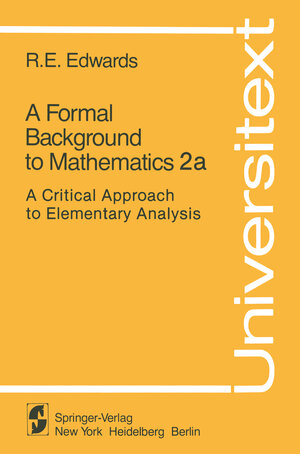
×
![Buchcover ISBN 9780387905136]()
Inhaltsverzeichnis
- VII: Convergence of Sequences.
- Hidden hypotheses.
- VII.1 Sequences convergent inR.
- VII.2 Infinite limits.
- VII.3 Subsequences.
- VII.4 The Monotone Convergence Principle again.
- VII.5 Suprema and infima of sets of real numbers.
- VII.6 Exponential and logarithmic functions.
- VII.7 The General Principle of Convergence.
- VIII: Continuity and Limits of Functions.
- and hidden hypotheses.
- VIII.1 Continuous functions.
- VIII.2 Properties of continuous functions.
- VIII.3 General exponential, logarithmic and power functions.
- VIII.4 Limit of a function at a point.
- VIII.5 Uniform continuity.
- VIII.6 Convergence of sequences of functions.
- VIII.7 Polynomial approximation.
- VIII.8 Another approach to expa.
- IX: Convergence of Series.
- IX.1 Series and their convergence.
- IX.2 Absolute and conditional convergence.
- IX.3 Decimal expansions.
- IX.4 Convergence of series of functions.
- X: Differentiation.
- X.1 Derivatives.
- X.2 Rules for differentiation.
- X.3 The mean value theorem and its corollaries.
- X.4 Primitives.
- X.5 Higher order derivatives.
- X.6 Extrema and derivatives.
- X.7 A differential equation and the exponential function again.
- X.8 Calculus in several variables.
- XI: Integration.
- XI.1 Integration and area.
- XI.2 Analytic definition and study of integration.
- XI.3 Integrals and primitives.
- XI.4 Integration by parts.
- XI.5 Integration by change of variable (or by substitution).
- XI.6 Termwise integration of sequences of functions.
- XI.7 Improper integrals.
- XI.8 First order linear differential equations.
- XI.9 Integrals in several variables.
- XII: Complex Numbers: Complex Exponential and Trigonometric Functions.
- XII.1 Definition of complex numbers.
- XII.2 Groups, subgroups and homomorphisms.
- XII.3 Homomorphisms ofRinto?; complex exponentials.
- XII.4 The exponential function with domainC.
- XII.5 The trigonometric functions cosine and sine.
- XII.6 Further inverse trigonometric functions.
- XII.7 The simple harmonic equation.
- XII.8 Another differential equation.
- XII.9 Matrices and complex numbers.
- XII.10 A glance at Fourier series.
- XII.11 Linear differential equations with constant coefficients.
- XIII: Concerning Approximate Integration.
- XIII.1 Quotes from syllabus notes.
- XIII.2 Notation and preliminaries.
- XIII.3 Precise formulation of statements XIII.1.1 – XIII.1.3.
- XIII.4 Some corrected versions.
- XIII.5 Falsity of statements XIII.3.1 – XIII.3.3.
- XIII.6 The formulas applied to tabulated data.
- XIV: Differential Coefficients.
- XIV.1 The d-notation and differential coefficients.
- XIV.2 The simple harmonic equation.
- XV: Lengths of Curves.
- XV.1 Quotes and criticisms.
- XV.2 Paths.
- XV.3 Lengths of paths.
- XV.4 Path length as an integral.
- XV.5 Ratio of arc length to chord length.
- XV.6 Additivity of arc length.
- XV.7 Equivalent paths; simple paths.
- XV.8 Circular arcs; application to complex exponential and trigonometric functions.
- XV.9 Angles and arguments.
- XV.10 General remarks about curves.



